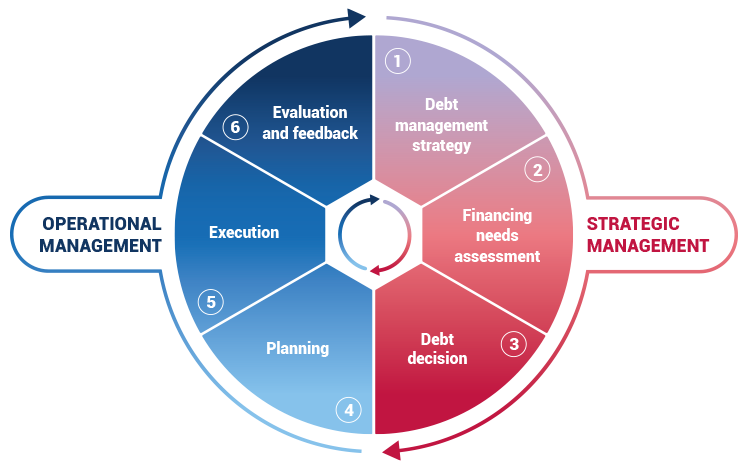Comprehending the Importance of a Well-Structured Financial Debt Administration Strategy for Financial Security
As individuals browse the intricacies of managing their monetary commitments, a calculated technique to financial debt administration can lead the method for a more safe and secure and thriving future. By understanding the basic concepts and useful approaches behind effective debt management, individuals can open the course to not just decreasing debt problems yet likewise growing a solid foundation for long-term monetary health.
The Influence of Financial Debt on Financial Security

Moreover, the influence of debt on economic security expands past simply the financial facets. It can likewise affect psychological health, partnerships, and overall health. The stress and anxiety and anxiousness related to overwhelming financial obligation can hinder decision-making capabilities and pressure specialist and individual relationships.
Therefore, it is important for people and organizations to thoroughly manage their debt degrees, making certain that it lines up with their financial goals and capabilities. By understanding the effects of financial obligation on financial security and executing reliable debt monitoring people, methods and companies can safeguard a much more thriving and steady economic future.
Parts of an Effective Debt Management Strategy
Offered the vital relevance of preserving financial stability amidst differing financial obligation degrees, recognizing the important parts of an effective debt management strategy is critical for companies and people alike. An extensive debt administration strategy commonly includes a thorough assessment of present financial debts, income, and costs to establish a clear monetary picture. Establishing specific and possible financial objectives is important in assisting the financial debt payment procedure. Focusing on debts based on rate of interest, with a focus on paying off high-interest financial obligations first, can save money in the future. Producing a thorough budget that allocates funds for debt repayment while still covering important costs is fundamental. Working out with lenders for reduced rate of interest or modified repayment plans can also be part of an efficient financial obligation management approach. Additionally, establishing a reserve to prevent gathering even more financial debt in situation of unforeseen costs is a prudent component of a well-shaped financial debt monitoring strategy. Consistently adjusting the strategy and keeping an eye on as needed guarantees its efficiency in attaining financial stability.
Benefits of Applying a Debt Settlement Technique

Tips for Developing a Sustainable Spending Plan
Structure a solid monetary structure begins with understanding the art of developing a lasting budget that aligns with your long-term financial goals and complements your financial obligation payment method. To produce a budget plan that promotes monetary stability, begin by tracking your earnings and costs to comprehend your monetary patterns. Categorize your expenses right into essential (such as real estate, energies, and grocery stores) and non-essential (like dining out and enjoyment) to focus on where your cash goes. Establish sensible costs limitations for every category, guaranteeing that your vital costs are covered while leaving space for savings and financial obligation repayments.
Bear in mind to allocate a part of your spending plan in the direction of building an emergency fund to cover unpredicted financial difficulties. By adhering to these tips and staying disciplined in your budgeting strategy, you can develop a sustainable monetary strategy that supports your long-lasting objectives and aids you achieve long-term economic stability.
Monitoring and Changing Your Financial Obligation Monitoring Strategy
Frequently examining and adjusting your financial debt monitoring strategy is essential for preserving monetary development and accomplishing financial obligation settlement objectives. Checking your debt management plan includes maintaining track of your income, costs, and financial obligation equilibriums to make certain that you are remaining on track with your monetary goals (debt management plan services). By frequently reviewing your plan, you can identify any kind of locations that may need modification, such as reducing on visit their website unnecessary expenditures or raising your financial see this website debt settlements
Changing your debt management strategy might be needed as your financial scenario advances. Life adjustments, such as a task loss or unforeseen expenses, might need you to reassess your plan and make alterations to fit these brand-new scenarios. Furthermore, as you pay down your debt, you may locate that you have additional funds available to allocate in the direction of financial obligation repayment or savings.

Final Thought
Finally, a well-structured financial debt administration strategy is necessary for keeping economic security. By comprehending the effect of debt, applying a payment strategy, developing a sustainable spending plan, and surveillance and changing the strategy as required, individuals can take control of their economic scenario and work towards a debt-free future. It is vital to prioritize economic health and wellness and make educated decisions to protect a prosperous and steady financial future.
By recognizing the fundamental principles and functional strategies behind reliable debt management, individuals can open the course to not just decreasing financial obligation worries but also growing a strong foundation for long-term monetary health.
Provided the crucial relevance of preserving economic stability amidst varying debt degrees, comprehending the essential elements of an effective financial obligation administration plan is vital for individuals and companies alike. A detailed financial debt monitoring strategy commonly includes an extensive evaluation of existing financial debts, income, and costs to establish a clear monetary photo - debt management plan services.On a regular basis analyzing and adjusting your financial obligation administration strategy is vital for preserving economic progression and achieving debt repayment goals. Monitoring your debt management plan involves maintaining track of your revenue, costs, and financial obligation balances to ensure that you are staying on track with your financial purposes